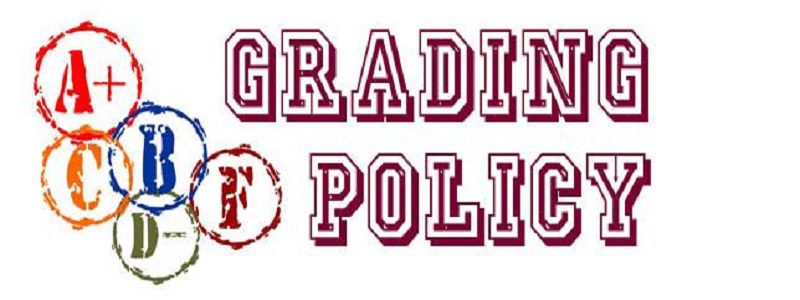Jennifer Gonzalez runs a popular edu-blog and podcast called Cult of Pedagogy that is consistently thoughtful and features a distinctively bouncy, novel, and practical voice. 
Recently, Cult of Pedagogy posted on grading: “How Accurate Are Your Grades?” After an introductory anecdote reporting on an assignment to build a volcano that likely included grading of parents’ involvement, money spent on supplies, and various other extra-academic factors, Cult of Pedagogy lays out its six guidelines, offered in the form of questions that are discussed in a manner that reveals that they are rhetorical. They are summed up on this graphic (Jennifer Gonzalez excels as a graphic designer.)
 In addition to these six guidelines, the post adds three “other factors to consider”: Late Work, Extra Credit, and Averaging.
In addition to these six guidelines, the post adds three “other factors to consider”: Late Work, Extra Credit, and Averaging.
While I agree with most of what the Cult of Pedagogy has to say in these nine guidelines, and I admire the style in which the ideas on grading are expressed, I do have four counter-thoughts (which you might think of softer, unsharpened counter-arguments) that the post itself inspired and that I think are worth sharing (perhaps generating, in turn, your own counter-thoughts).
(1)
The problem that Jennifer Gonzalez and others identify with deducting significant points for late work is real. We want to reinforce for our students that deadlines matter and that organizing themselves so that they can complete their work on time is a “life skill.” But we are distorting a report on how much of the skills and content in our curriculum students have learned when we blend grades in with punctuality penalties. And for some students punctuality penalties can be both common and severe. Penny Kittle and Kelly Gallagher’s new book 180 Days Two Teachers and the Quest to Engage and Empower Adolescents (Heinemann, 2018) has an interesting idea to address this concern. On a due date for a project or assessment that students have been working on out-of-school — a research paper, an interpretive argument essay, a PowerPoint presentation, an extended lab report — Kittle and Gallagher require that students turn in the project before they leave class that day in whatever shape the work is in. Even if in the worst-case scenario it only reflects the work they have done in that class period alone, every student has turned in the assignment and will be graded based on the draft that has been submitted. Then they give students feedback on how they can improve their work, along with a grade (based of course on whatever rubric applies). Every student has an opportunity to turn in a revision, or multiple revisions, to keep turning in a new “best draft” (they don’t use the term “final draft”) of their project, and the higher grade will always replace the lower one.
(2)
The Cult of Pedagogy’s concern about “grade averaging” can be addressed if teachers weight assessments more intentionally and carefully than they sometimes do. If you use a point system for grading, different assignments should be worth different and very carefully considered point levels, such that when they are all added together into one aggregate point total, the comparative importance of projects, quizzes, essays, reports, presentations, classroom discussion/argument, etc., is all given a carefully proportionate weight. Cult of Pedagy is concerned that work done later in the semester may reflect learning that takes place during the semester and therefore shouldn’t be averaged in equally with earlier work. I see the concern, but the way to address the difference in your weighting is to make assessments that are turned in later in the semester worth 1.5X, 2X, or 3X what the same kind of assessment was worth earlier in the semester. Think this through so that all assessments are given the proportionate weight in an aggregated point system that you want them to have, and post this system with transparency and reminders for students.
(3)
I think that the Cult of Pedagogy goes a little too far in their explanation of rule #2, “Teach everything you measure.” What we often do in class is motivate and inspire students to think and read about our subject area outside of class, whether or not this is “homework.” So, for instance, if we’re teaching students about argumentative reasoning and we do a lesson or two on logical fallacies, we want students to learn and practice the underlying cognitive skill of critical, skeptical thinking. We want students to be practicing that critical, skeptical thinking on a wider range of material than only the 5 or 6 specific logical fallacies that we teach directly. If we are in the business of building habits of mind that are oriented toward academic success at the college level and beyond, we do not need to be (and probably should not be) as literal as the Cult of Pedagogy is on making sure that everything that we include on an assessment has been taught specifically by us in class.
(4)
What posts like this — notwithstanding their virtues and utility — often overlook, in my view, is a recognition of the motivating and energy-producing function that many of us find valuable in grading systems. Many educators — and I put myself in this camp — think of grades as simply another tool in the professional toolbox for getting students working on the skills and content we want them to develop so that they will be better able to succeed at the next level academically (at many high schools this means that students need to become ready to access, be admitted to, and succeed in a four-year college) and to live a fulfilling life as a more critical, logical, scientific, and humanistic thinker and communicator. Grades are for me not ends in themselves, or even intrinsically very meaningful. They are one of the ways that we get students to learn.
So, any grading system has to be useful as a motivational tool, too, in addition to being fairly constructed and fully aligned with our curricular design. Part of that for me has always meant grading fairly but rigorously, especially in the odd quarters, so that students know that they will need to work hard to get the grade that they want. But this also means that I recommend adjusting the difficulty level of grading relative to student motivational response. To do this you have to be closer observers of how your grading is impacting your specific students’ motivational levels. And you will need to calibrate over time so that you get the “tension level” just right: pushing students to learn more, work harder, but not making the system too strenuous, leading students to throw in the tool and conclude that they cannot succeed. This paradigm also encourages you to adjust the level of difficulty of assessments during the course of the year; for instance, if people are struggling and you fear that their motivational levels are slipping, consider throwing in an easier assessment to restore morale. I know there has emerged in education a conventional wisdom that is skeptical of the power of grading, and that looks to more intrinsic motivational features in instruction. What I’m suggesting is that teachers not go too far in that direction and cast away any and all motivational force that grades still do have.


 In addition to these six guidelines, the post adds three “other factors to consider”: Late Work, Extra Credit, and Averaging.
In addition to these six guidelines, the post adds three “other factors to consider”: Late Work, Extra Credit, and Averaging.
